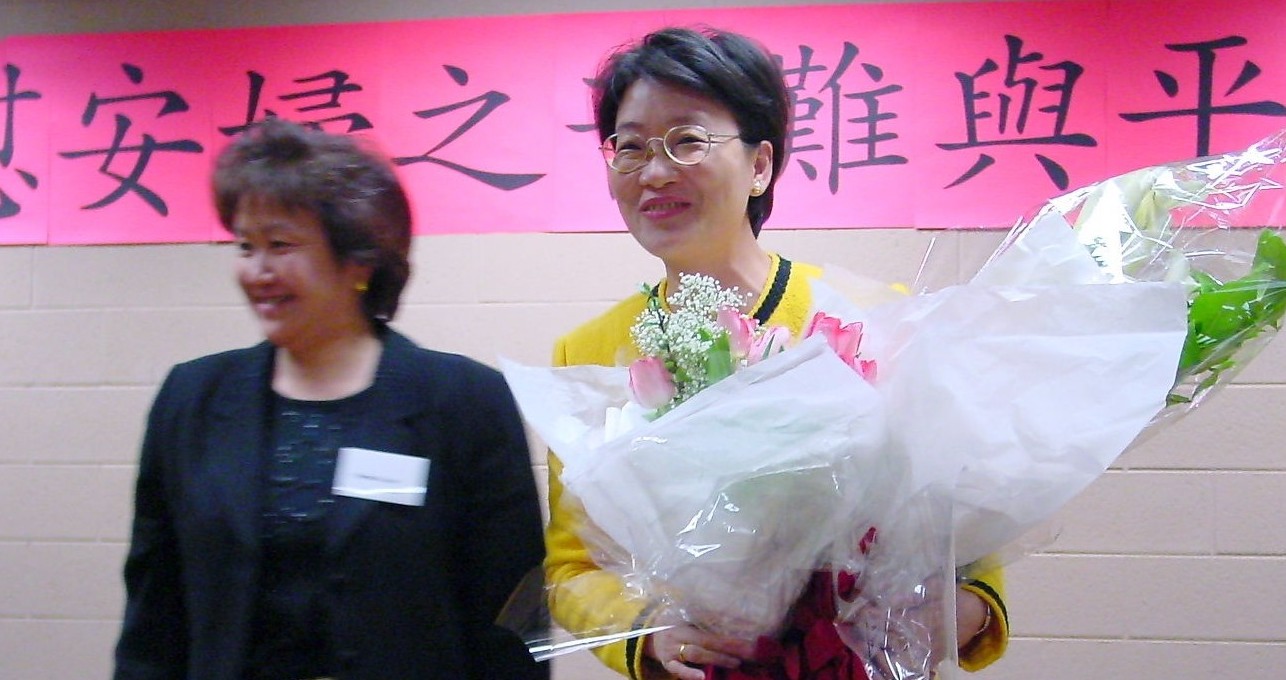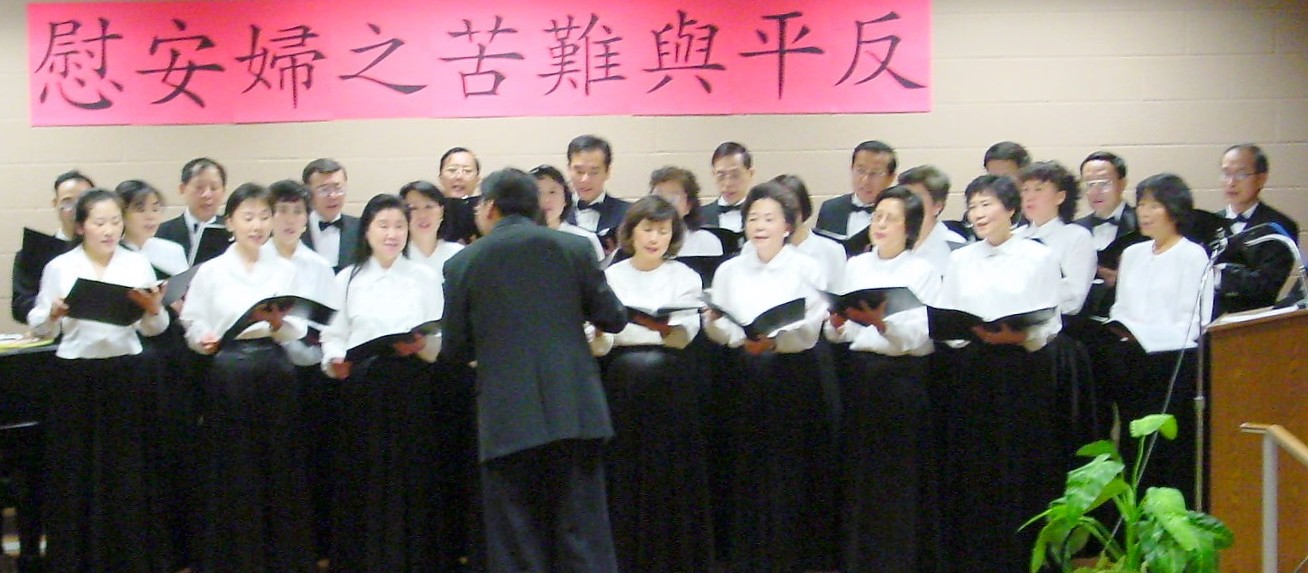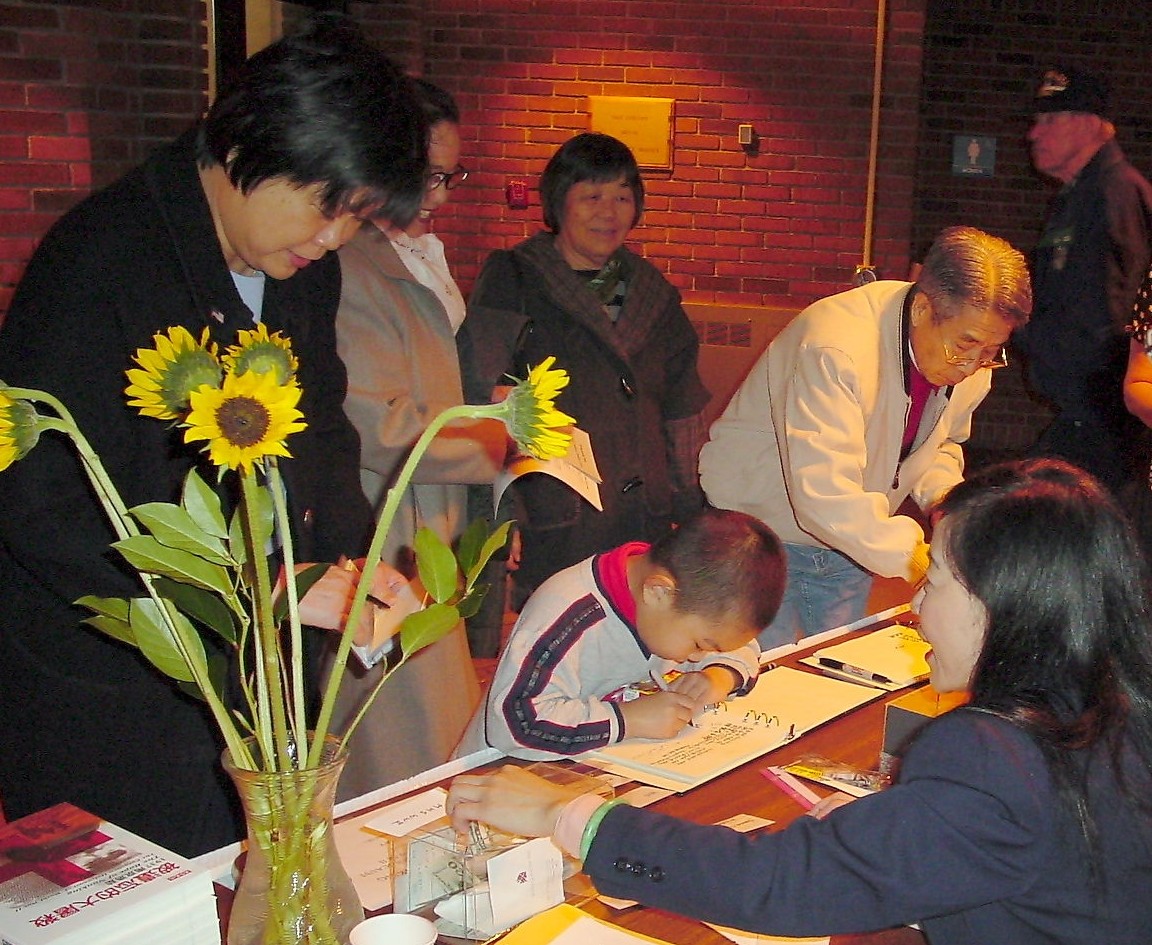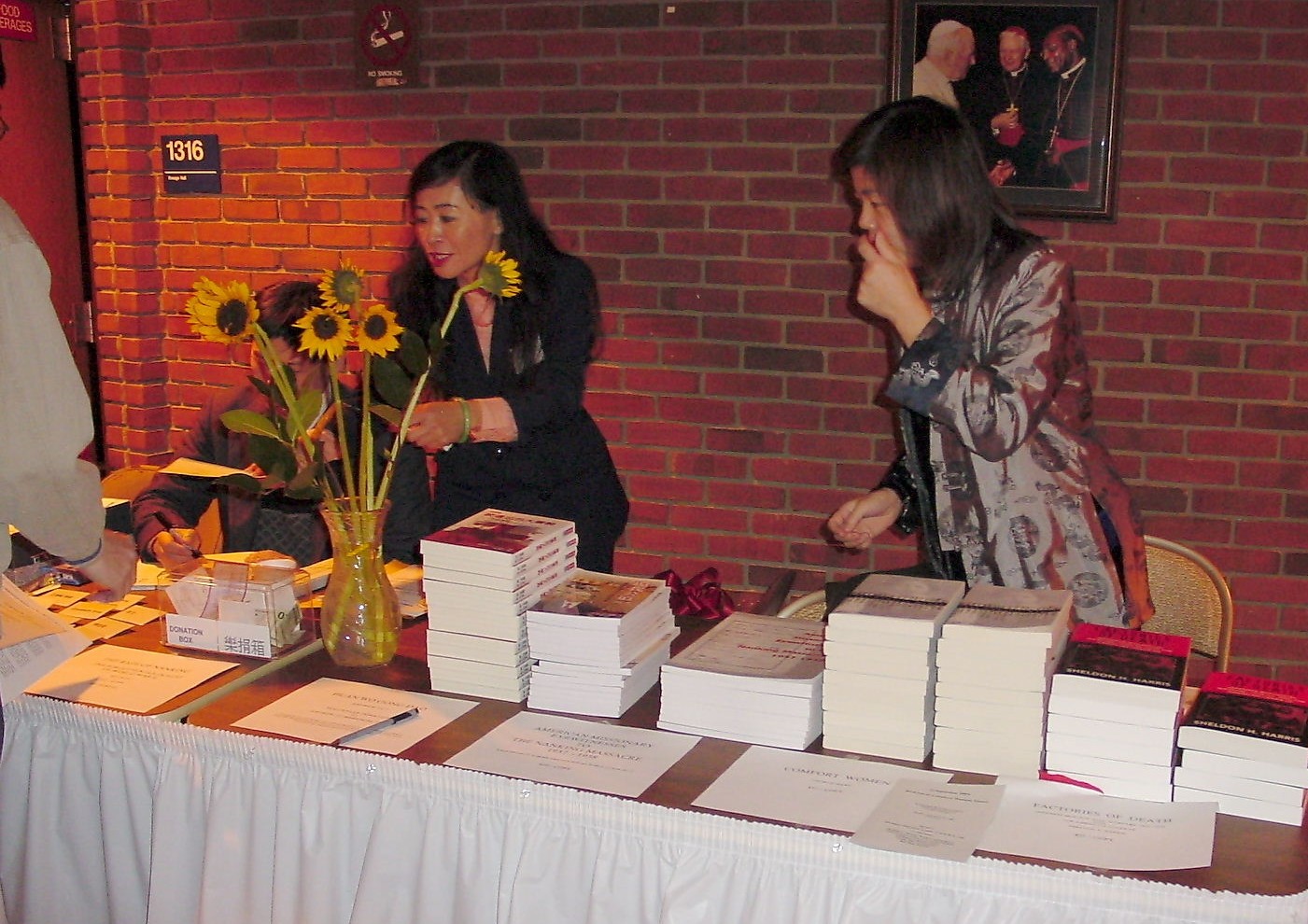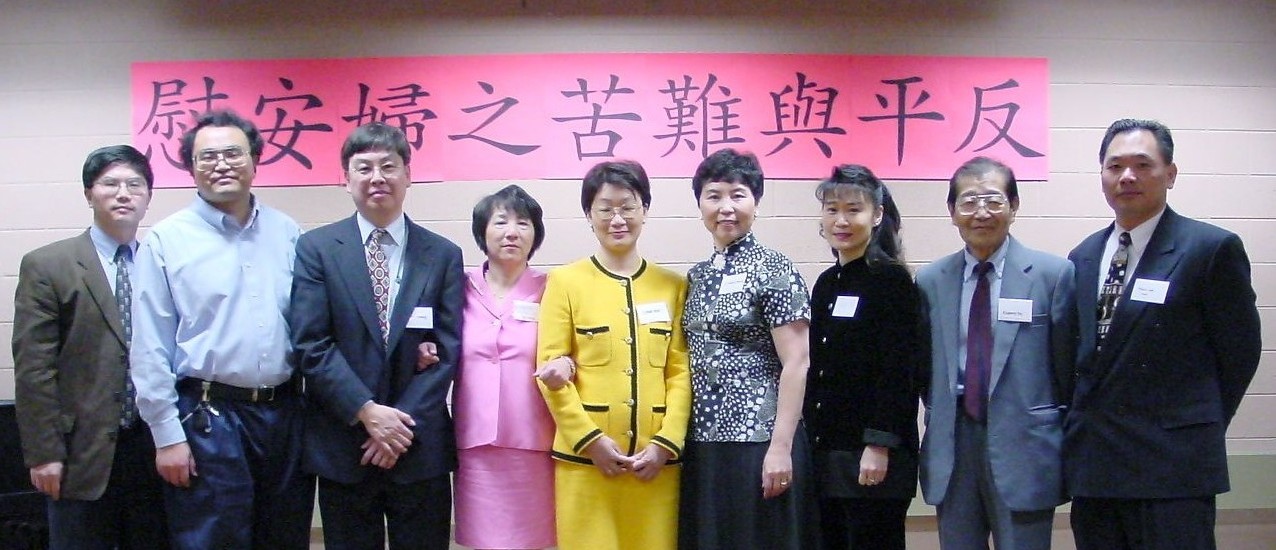|
News & Events
Table of Contents
News Update
Highlights of Past Activities
International Conferences
International Citizens Forum on Wartime Crimes and Redress---Seeking Reconciliation and Peace in the 21st Century
(December 10 - 12, 1999)
Womens International War Crimes Tribunal on Japans Military Sexual Slavery, Tokyo (December 8-12,
2000)
International Conference on 50 Years of Denial - Japan and Its Wartime Responsibilities(September 6 8, 2001)
* * *
News Update -
During WWII, untold thousands of euphemistically so-called comfort women
were systematically rounded up and imprisoned in comfort stations, Japanese army-run brothels where they were daily abused
by Japanese military personnel. They totaled two hundred thousands, comprising Burmese, Chinese, Dutch, Filipino, Indonesian,
Korean, Taiwanese and Vietnamese teenage and older females. An unknown number committed suicide or perished due to V. D.
or failed escape. Since WWII, violence against women in armed conflict continues, e. g., in Rwanda and the former Yugoslavia.
Thus, Michigan Historical Society of World War II in Asia has planned to hold a forum on the issue of Comfort women
and its redress. We cordially invite everyone concerned to reserve December 16, 2001, 2 - 5 p. m. for participating in the
forum, to be held in Kresge Hall, Madonna University, Livonia, MI. Ms. Wang Ching Feng, Esq., Taipei Womens Rescue Foundation,
will present the keynote speech.
Cosponsors for the event: Chinese Association of Greater Detroit and Michigan
Chinese Women Association. Detailed program will follow.
Highlights of Past Activities -
1997 - Organized
community commemoration of the 60th anniversary of the Nanking Massacre (December 13, 1997).
1998 - Invited Iris
Chang to lecture on that massacre at Lawrence Technological University and University of Michigan (May 1998), and supported
the Nanjing Symposium at University of Illinois (October 1998).
1999 - Initiated a drive (March 1999) to donate
books to public libraries and schools, including The Rape of Nanking-the Forgotten Holocaust of WW II by Iris Chang, The Comfort
Women by G. Hicks and Factories of Death - Japans research and experiment with biological warfare by S. H. Harris (March 1999);
supported the Chinese Holocaust Museum, Oakland, CA; held a millennium memorial meeting with keynote speech by Prof. S. H.
Harris on the Horrors of WWII in Asia and exhibit of Japans experiments with humans for biological warfare (Dec. 4, 1999);
and sent delegates to participate in Tokyo International Citizen's Forum on Wartime Crimes and Redress (Dec. 10 - 12, 1999).
2000 - Sponsored the Year 2000 Symposium on Closure of World War II Wounds with keynote speech by Prof. Richard Chu
on the redress movement and report on international conference on the Redress Movement re WWII Crimes in Asia by Elizabeth
King, president of Human Rights for China (Dec. 3, 2000).
2001 - Participated in worldwide campaign to nominate Prof.
Saburo Ienaga for the 201 Nobel Peace Prize ; organized an commemorative event on the 60th anniversary of Minnie Vautrins
passing (May 2001) and initiated a Minnie Vautrin memorial scholarship fund drive---see brief biography of Minnie Vautrin
in Eyewitnesses; plan for a forum on crimes against women in armed conflicts with special reference to the comfort women issue---see
news update.
International Conferences -
International Citizens Forum on War Crimes and Redress---Seeking
Reconciliation and Peace in the 21st Century (December 10 - 12, 1999)
The ICF, the first of its kind, was held in
Tokyo by the initiative of the Japan Organizing Committee, comprising concerned Japanese attorneys, scholars, physicians,
and activists. Supporting organizations included Global Alliance for Preserving the History of WW II in Asia, World Jewish
Congress, Canadian Jewish Congress, and Teachers' Federations from Hong Kong and Taiwan. 80 delegates attended from the United
States, Canada, Germany, the Philippines, Korea, Hong Kong, Taiwan, and Mainland China.
See Invited Speech for
a summary of the forum proceedings by Liz King. In addition, we reprint below an excerpt from the keynote address by Mark
Weintraub, National Chair of Community Relations of Canadian Jewish Congress, on Accountability, Justice and the Importance
of Memory in the Era of War.
Through memory, we honor the wishes of the victims that they never be forgotten. Through
memory we ensure that those who were slaughtered in innocence will never be forgotten, each as a complex human universe, who
lived with achievements, great and small, and all with untold potential. Memory connects us with the victims and thereby engages
us in the sacred act of revival, returning all to a form of life so at least their torment and murder will never be shrouded
in oblivion.
The act of remembering also joins us with the survivors in a collective acknowledgment of their suffering.
Those of us who are of the second and even third generations, by rekindling memory, link ourselves to our survivor parents
and grandparents, broadening our understanding and strengthening our love for them.
Memory, however, must not only
be internalized. It must also be externalized. The victims and the survivors must be given a voice and that voice, though
it may start as a whisper, must end up as a lions roar. That is how memory can lead to history. Rekindling memory and the
writing of history, coupled with advocacy, are the only possible paths which can lead the successor governments of perpetrator
states to acknowledge the past and to confront it honestly. Only as a result of such accountability can there come sincere
remorse so that the past may be redeemed from absolute evil.
Womens International War Crimes Tribunal on Japans Military
Sexual Slavery, Tokyo (December 8-12, 2000)
Convened by Japan Organizing Committee led by Violence Against Women
in War Network, Japan, the Korean Council for the Women Drafted for Military Sexual Slavery by Japan and other organizations
of victimized countries, and the International Advisory Committee led by Asian Center for Womens Human Rights.
Objectives
for the tribunal: Bring out truths and establish the responsibility of states and individuals involved in the sexual slavery
of comfort women; restore justice, human rights and dignity to the victims, thereby helping end the cycle of impunity for
violence against women in wartime and armed conflicts and prevent repetition of such crimes; make the full documentation public
to the world as indelible records of the 20th century history.
The chief prosecutors for this grass-roots-initiated
tribunal include Patricia Viseur-Sellers (legal advisor, International Criminal Tribunal for the former Yugoslavia), Ustima
Dolgopol (Flinders University, Australia), and Hina Jilani (Lawyer for the Supreme Court, Pakistan). The four judges, led
by Gabrielle Kirk McDonald, former president of the War Crimes Tribunal for the former Yugoslavia, determined that Emperor
Showa knew or should have known about the atrocities committed by Japanese troops because he had ultimate authority over the
government and the military and that the comfort woman system, established and maintained by Japans government and military,
violated a number of international treaties that were in effect at the time of the war by systematically forcing women into
sexual slavery.
The judges concluded that the Japanese government is legally responsible for the "comfort woman"
system and obliged to compensate the victims. They urged said government to provide the surviving victims with financial
compensation, erect memorial monuments for the victims and educate Japanese youth about the issue. The judges also called
on the UN to take all necessary steps to ensure the Japanese government provide reparations to the victims. Although the
tribunals decision has no legal power, organizers hope that it will persuade the Japanese government to compensate the victims.
For more on the tribunal proceedings, visit website for B. C. ALPHA---see Related Links.
International Conference
on 50 Years of Denial - Japan and Its Wartime Responsibilities, San Francisco, CA (September 6-9, 2001)
This historic
conference was organized as one of several events to counter a lop-sided celebration of the 50th anniversary of the signing
of the San Francisco Peace Treaty on September 8, 1951. In his opening speech, excerpted below, Professor L. Ling-chi Wang,
co-chair of the Conference Planning Committee, noted the events that underscored the need and importance for this conference.
Visit websites shown in Related Links for the conference proceedings.
Excerpt of Prof. L. Ling-chi Wangs Speech:
On behalf of the Conferences Planning Committee and its co-sponsors, the Asian American Studies at University of
California, Berkeley (UC), and the Rape of Nanking Redress Coalition (RNRC), I would like to welcome all the international
and American participants to San Francisco and to this historic international conference .
Planning for this conference
began in March 2000 when RNRC learned that the government of Japan and the U.S., as well as American and Japanese leaders
from business, academe, and culture, have agreed that the 50th anniversary of the signing of the San Francisco Peace Treaty
on September 8, 1951 presents a unique opportunity for our City and State to be the venue for a series events that will look
ahead to the next fifty years of American relations with Japan and the Pacific. The political and corporate leaders of both
countries agreed to a series of commemorative events, including an official commemorative ceremony and dinner, several cultural
events, and an international conference. They thus planned multimillion high-profile events to highlight the significance
of the U.S.-Japan relationship in a regional and global context, addressing the question of the respective roles of the US
and Japan in the 21st Century.
From a different perspective, the RNRC saw the 50th anniversary as an opportunity
for the Asian American communities in the San Francisco bay area to call on the government of Japan to deal with the proper
closure of the Asia/Pacific war: Japans wartime responsibilities and the need for Japan to apologize, through an act of its
Diet, to the fourteen countries it invaded and brutalized and to compensate the victims of its atrocities. To the majority
of Asian Americans in the bay area, the planned anniversary events instantly recalled the pain and suffering of themselves,
their parents and grandparents during the Japanese invasion. As long as this failure (to apologize) persists, there will
be no peace in Asia or peace between the U.S. and Japan as long as Japan is unwilling to face its past squarely and come clean
with the people in the U.S. and in Asian countries, noted a report for the RNRC on March 17, 2000.
To implement
one of the five counter-events recommended by the March 2000 report, the RNRC requested the faculty of Asian American Studies
at UC Berkeley to help organize a scholarly and educational conference and pledged the necessary financial support. In May
2000, the faculty agreed to convene the conference such that it would be both international and multiracial. To highlight
the failed legacy of the San Francisco Peace Treaty, the conference planning committee decided on the theme: 50 Years of Denial:
Japan and Its Wartime Responsibilities.
Thus we have invited scholars to present their research as well as eyewitnesses
and victims of Japanese atrocities whose perspectives and voices have been silenced for decades. We also invited international
scholars and activists in the campaign for justice to share their knowledge and experience at the conference, as well as the
participation of the Honorable Nobuaki Tanaka, Consul-General of Japan. Finally, we also included legal scholars and lawyers
representing the victims: the comfort women, the POWs, and victims of slave labor and biological and chemical warfare and
experimentation.
During the conference planning process, we were aided by several high-profile international events.
Among them are:
*Under strong pressure, the Japanese publisher of Iris Changs best-selling book, The Rape of Nanking,
decided not to release the book to the Japanese-reading public.
*Prime Minister Yoshiro Mori declared in May 2000
that Japan is a divine country centered on the Emperor---while he apologized under pressure at home and abroad, he refused
to retract his statement.
*Several lawsuits filed in U.S. federal courts by former comfort women, POWs, and victims
of slave labor were jeopardized by active and incredible opposition against the plaintiffs, filed by the U.S. Departments
of Justice and State on the ground, among others, the San Francisco Peace Treaty.
*The Womens International War
Crime Tribunal of Japans Military Sexual Slavery, convened in Tokyo, Dec. 8-12, 2000, found the late Emperor Hirohito guilty
of crimes against humanity and concluded that the Japanese government was legally responsible for the comfort woman system
and obliged to compensate the victims.
*The nomination, initiated in Hong Kong in December 2000, of Professor Saburo
Ienaga, a highly respected historian and a courageous and tireless defender of historical truth in Japan, for the Nobel Peace
Prize of 2001.
*The publication of several important historical works, including two Pulitzer Prize winning books,
Embracing Defeat by John Dower and
Hirohito by Herbert Bix, both showing the guilt of Hirohito and the change of U. S.
postwar policy dictated by cold war priorities.
*Japanese government approval in April of a new history textbook
for junior high schools written by nationalist scholars defending Japans role in the Asia/Pacific war, prompting diplomatic
protests and sustained public demonstrations from Japans neighbors.
*On August 13, in spite of strong opposition
at home and abroad, Prime Minister Junichiro Koizumi fulfilled a campaign pledge by visiting Yasukuni Shrine, a Shinto monument
honoring Japans war dead, including convicted Class A war criminals.
What is the true legacy of the San Francisco
Peace Treaty? Is Japan at peace with itself and with its neighbors? The recent events suggest a nation unwilling to acknowledge
and repudiate the wrongs it inflicted upon others and unable to constrain its worst elements. This is what has been alarming
to its own people and neighbors, as Japan seeks to rearm itself.
The intent of this conference is to call on the
Japanese government to embrace official repentance with monetary restitution, such as postwar Germany has been doing and the
U. S. has done in 1988 in response to Japanese American demand for apology and reparation. So long as Japan is unwilling
to face squarely with its past aggressions, it is inconceivable how it can reconcile and live with its neighbors in peace.
We also call on the U.S. to recognize the flaws inherent in the peace treaty and to take steps toward obtaining justice for
the victims and peace in the Asia/Pacific region.
=========================================================
The flower is for the 300,000 Chinese People Killed in Nanjing
Massacre during World War II.

.. After the initial massacre had run its course, the streets within the city were strewn with corpses, baggage, parcels,
and all sorts of other miscellaneous items. Not only were cars unable to pass through, even making one's way by foot was made
difficult by the mess......
|


